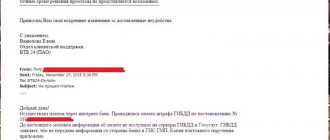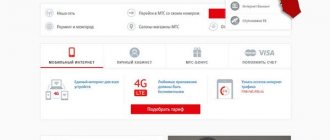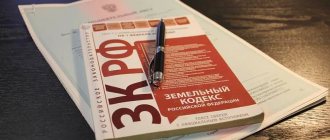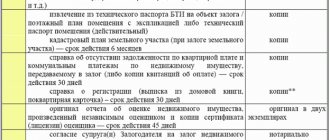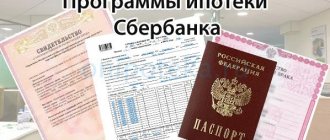How long can you store valuables in a cell?
The cell can be rented for any time. Usually the contract is concluded for a period from 1 day to 3 years with the possibility of extension (prolongation). And here you need to be careful. The bank can prolong the agreement by default, then your valuables remain in the cell, and you only pay the required amount for storage.
If there is no automatic extension, it all depends on the contract. Some banks will remind you that your lease is expiring, while others will not.
In any case, if you do not pick up the property on time, the bank may open the safe and place the contents in a single locked bank vault. And when you decide to pick up your items, you may be required to pay compensation - a fine and a higher storage fee.
To avoid unpleasant surprises, you should carefully study all the terms of the contract.
GUILD OF REALTORS OF THE MOSCOW REGION
Photo: novostey.com
I’ll start with the fact that the parties sign the agreement, then transfer the package of documents to the registration authority, where the papers gather dust (or remain) for 11 long days. Then the government agency registers the transfer of ownership, after which the contract is considered concluded.
Anyone who thinks that this procedure does not contain any risks is deeply mistaken. No, the danger comes not from the state, of course, but from each of the parties to the transaction. Judge for yourself. If the buyer gives the money at the time of signing the agreement (in other words, 11 days before its registration), then he seriously risks that the seller will not carry out the transaction and will report to the government body a refusal to register the transfer of rights. As a result, the acquirer will be left without money and without real estate. But the second option is also possible, when the parties agreed to pay for the property after registration. In this case, the seller is at serious risk, because there is a possibility that the buyer will not be able or will not want to pay for the property registered in his name, as a result of which the seller will be left with nothing.
Given these circumstances, two options for settlements under sales and purchase agreements have emerged in the real estate market.
Letter of Credit
First of all, payment under the letter of credit. A letter of credit is a banking transaction. In accordance with it, the bank, at the direction of the client, undertakes to make a payment to a third party. If we consider the purchase and sale of property, the scheme for using a letter of credit will be as follows: - the seller and the buyer enter into an agreement in which a letter of credit is provided as a form of payment for the transaction; — the purchaser of real estate sends an application to a credit institution with a request to issue a letter of credit; - the bank opens a special account in the name of the seller, which is called “Letter of Credit”, and transfers money to it from the buyer’s personal account; - the seller will be able to receive this money only after registering the transfer of property rights to the buyer, providing the bank with all the documents necessary under the purchase and sale agreement. If the papers are in order, then the seller takes the money.
What documents can the bank require to confirm the official transfer of ownership? Usually this is a purchase and sale agreement that has passed state registration.
Some banks request an extract from the unified state register confirming the registration of the buyer's ownership of the purchased apartment. But these are, as they say, details. Each credit institution has its own requirements, and you need to be prepared for them.
It is especially worth emphasizing that a letter of credit can be revocable or irrevocable.
An irrevocable letter of credit means that the bank does not have the right to change or cancel the obligation to pay the amount specified in the letter of credit without the consent of all parties, namely the buyer, the seller and the confirming bank.
A revocable letter of credit, on the other hand, gives the bank the right to cancel or amend the letter of credit without the prior consent of others.
Although a letter of credit as a form of payment has many positive aspects, it also has a number of significant disadvantages. These practices include complex and voluminous document flow, which is carried out in order to control each stage of the transaction and, of course, the presence of bank commissions for this service. As a rule, the commission is calculated based on the transaction amount and ranges from 0.5% to 2-5%. It is clear that the commission increases the cost of property and costs for citizens. Negative aspects also include the fact that when issuing a letter of credit, the parties to the agreement indicate the full and market value of the property, which subsequently affects the taxation of both the transaction and the real estate itself. In the direction of increase, of course.
Bank safe deposit box
Taking into account these nuances, such a payment method as payment through a safe deposit box has become widespread.
Typically this process goes like this. At the appointed time, the seller, buyer, as well as the bank’s lawyer and realtor (if the transaction occurs with his participation) meet at the office of the credit institution. After clarifying the details, interested parties sign an agreement to rent a safe deposit box.
However, before signing the lease agreement, the parties, as a rule, agree on the conditions and papers, in the presence of which the cell will be opened.
For example, during the first 25 days, only the seller can open the locker by presenting a registered purchase and sale agreement or a notarized copy of the certificate of ownership of the object in the name of the buyer, and from the twenty-sixth to the thirtieth day - by the buyer, presenting his passport.
If for some reason the transaction was not registered during the specified period, clients can extend the contract.
In general, based on Russian conditions, a safe deposit box rental agreement is the most optimal when paying for real estate. It should be remembered that the purchase and sale agreement rarely indicates the actual amount of the transaction and when paying through a cell, it will never be disclosed, unlike, say, a letter of credit or a wire transfer.
And the rental cost is relatively low. It depends on the size of the cell and the rental period and ranges from 1000 to 5000 rubles. per month from various banks. In any case, it is cheaper than a letter of credit.
You should not think that when paying through a safe deposit box, the parties to the contract do not take any risks. In my practice, there was a precedent when the seller of an apartment immediately after registering the transaction contacted the bank and, citing the loss of the key to the safe, gained access to its contents and took away the funds. It would seem, what is the problem, since they were already intended for him? The thing is that his own receipt was kept in the safe deposit box, and the parties to the transaction agreed to visit the safe together so that the buyer would take the receipt and the seller would take the money. The buyer also had the key to the box, and he mistakenly believed that the seller would not be able to get to its contents. The result of such deception was a two-year trial in which, with great effort, the buyer managed to prove the fact of payment under the contract, when the seller was very close to terminating the contract and returning the residential premises to his ownership, let me remind you, and this despite the fact that he received the funds in full .
The article was written specifically for the analytical portal www.irn.ru. The author is a lawyer, president of the Guild of Real Estate Lawyers, head of the Legal Center of lawyer Oleg Sukhov
Source: IRN.RU
How much does a cell cost?
The larger the cell size, the more expensive the rent. On average, a safe will cost you from 40 to 90 rubles per day.
Banks often give a discount of up to 50% on the rental of safe deposit boxes. For example, clients who open holiday deposits, or owners of premium service packages.
Additionally, you may be asked for a deposit for the key and use of the locker. Here the numbers can differ by an order of magnitude: in some banks the deposit is 500 rubles, in others - 3000. The deposit will be returned when you empty the safe.
Are all cells equally secure?
The basic requirements for the security of bank vaults and safes are specified in GOSTs (the necessary standards can be found by searching on the Rosstandart website for the query “vault security”). Plus, banks are developing internal security standards. But in general, there are no big differences in the security systems of different banks.
And, despite all the efforts of banks, sometimes it happens that they are robbed and bank deposit boxes are hacked. Moreover, this happens in both large and small banks. There is no pattern here. The chance that scammers will target your bank is very small, but it cannot be completely ruled out.
What happens if robbers do steal valuables from my safe deposit box?
The chances of returning the stolen property or receiving its value in cash depend on the agreement you entered into with the bank.
It is safer to use a custody agreement . In this case, the bank is responsible for the safety of the contents. Valuables are accepted and issued according to the inventory. If you put money in a safe deposit box, the bank will count it and check its authenticity. If you are going to store other property, the bank will hire an appraiser to enter the fair value into the contract. You will have to pay for this separately. But if something disappears from the cell, the bank must fully compensate for the damage. But not all banks provide this service.
Much more often they offer a regular lease agreement . This means that the bank does not control what is in the safe: the bookmark occurs without an inventory and without the participation of bank employees. A safe deposit box is opened with two keys: one is kept with you, the other is kept in the bank. Therefore, the bank employee will enter the vault with you to open the safe with his key. Then he will leave the room, and you will have time to put your valuables in the box.
In any case, the bank is responsible for the safety of the safe. By law, if a cell is robbed, the bank is obliged to compensate you for losses, that is, fully compensate for the amount of missing property. And you can sue the bank. But in fact, it will be difficult to prove without an inventory that there was a diamond necklace in the cell and not a bag of chips. In this situation, all hope is only with the police.
Thus, under a lease agreement, it is safest to store only what is of no interest to bank robbers - for example, documents. Another option is to separately insure the property. If the bank itself does not offer you this service, you can contact a third-party insurance company.
Payments through a cell are dangerous - they are often stolen
Increasingly, people are frightened by stories about the theft of funds from safe deposit boxes. The media periodically publish burning articles about the disappearance of tens of millions of rubles and hundreds of thousands of dollars placed in bank safes for safekeeping.
At the same time , the situation is aggravated by the fact that this service is incredibly popular - payments through a safe deposit box accompany the bulk of real estate purchase and sale transactions and have become familiar and familiar to the population.
Risks when making payments through a cell
The main risk is the impersonality of the contents of a safe deposit box. Despite the fact that when signing the contract, both the buyer and the seller enter the storage facility, count the money and make sure that it is there, it will still be very, very difficult to prove the loss of funds.
Representatives of law enforcement agencies say that it is almost impossible to do this. As a rule, it is not difficult to identify the attacker, but it is not possible to impute specific damage (a specific amount or value) to him due to the same impersonality of the content.
The purpose of an individual safe is to protect the client from “extraordinary eyes” both from regulatory authorities and from bank employees. In this case, confidentiality is not on the client’s side, depriving him of the opportunity to receive compensation for the values stolen from the cell.
Responsibility of the bank for theft from a safe deposit box
Despite the obvious guilt of the credit institution for allowing criminals into the storage facility and breaking into the cell, it will not be possible to hold it accountable and demand compensation for material damage.
The fact is that according to the law, the bank is responsible for the safety of the safe, but not for the safety of its contents. This is a paradox that exists on completely legal grounds.
, a credit institution has one, but very weighty, argument: since a bank employee is not present when placing valuables in the cell, he cannot know about the contents. For the court, such arguments are enough to reject the client’s claim against the bank for theft of valuables from the safe deposit box.
Is the danger really that great?
In practice, theft from safe deposit boxes is rather an exception to the rule, and one can count on one hand all the cases of lost valuables. However, these are official statistics and one should take into account the fact that such incidents are hushed up at all costs in order to prevent damage to the reputation of the credit institution. The bank does not benefit from publicity and can try to play on this in the event of such an incident.
At the same time, recently there have been more and more frequent reports in the federal media that storing money in bank safes is dangerous due to the increased incidence of thefts and break-ins. We admit that such articles are populist, because they all encourage the execution of real estate transactions through a notary, assuring that it is reliable and CHEAP. One can even assume that such stuffing is created by lobbyists of the Federal Notary Chamber, as is often the case with lawyers seeking to limit the market for legal services.
Is there an alternative to "bookmarking"?
There are countless options, here are just a few:
VALUABLE STORAGE AGREEMENT, which is drawn up between the client and the bank in relation to specific property placed in the safe deposit box. At the same time, an inventory will be compiled and, if necessary, an assessment will be carried out. In this case, the credit institution is fully responsible for the property named in the storage agreement, including cash and jewelry.
PAYMENT THROUGH LETTER OF CREDIT. Recently, banks have begun to more often offer such calculations to their clients coming for a real estate transaction. We have been talking about the possibility of making payments through a letter of credit for ten years now, but due to the slowness of credit institutions, it was almost impossible to implement such schemes. Now banks themselves offer similar services. It is unknown whether they spied on foreign colleagues or reached this point themselves, but payment through a letter of credit is a reality today.
The value of a letter of credit lies in the fact that during the state registration of the transfer of rights to the new owner, the money is in a special bank account and is transferred only after providing supporting documents about the transaction. At the same time, the money is “always in sight” and the bank bears full responsibility for it.
BANAL NON-CASH PAYMENT. A form of payment undeservedly “forgotten” by transaction participants. And the reason for this is the lack of trust of the buyer and seller in each other. If you transfer an advance payment, there are risks of refusal to register the agreement and theft of funds by a dishonest participant in the transaction. If you agree on payment “after the fact”, then the seller is at risk, who as a result will not receive money and will be involved in a long and expensive legal process to terminate the transaction and cancel the state registration record.
We conclude that the most optimal and budget option is SETTLEMENT THROUGH A LETTER OF CREDIT, which allows you to protect both the seller and the buyer. We hope that every year it will gain more and more popularity.
Add a comment Cancel reply
How to rent a safe deposit box in a bank?
1. First you need to draw up an agreement, for this you will need a passport. If you want to use a safe deposit box to transfer money, for example, for a plot of land, you must come to the bank together with the seller and conclude a tripartite agreement.
2. Select the cell size and rental period. To complete the transaction, the locker is needed for a short period of time, usually no more than a month, but if necessary, the lease can be extended.
It is better to choose an agreement with automatic renewal (extension), otherwise you (or even together with the seller) will need to come to the bank again to renew the lease.
3. After this, you will be given a key to the cell. The second key remains with the bank. Additionally, you may be given, for example, a one-time electronic pass to enter the storage unit.
If you are going to transfer money for the purchase of an apartment or plot using a safe deposit box, then you can immediately hand over the key to the seller. But he will be able to use it only after the property becomes yours.
4. To put something into or take something from a cell, you and a bank employee enter the vault. The employee opens the locker with his key, and you open it with yours. Depending on what type of agreement you have - rental or storage of valuables - the bank representative either controls what you put in or take out, or leaves you alone with the safe.
If you choose a storage agreement for valuables, the bank counts the money and checks its authenticity, draws up an inventory, and then places it in a safe deposit box in front of you. If it is a lease agreement, the bank employee does not check what you put there.
5. After you place or pick up the property, you (or the seller) lock it with your key, and the employee with his.
6. To access the locker again, you will need to present your passport again.
If you are buying real estate, after putting money in the box, you can work with the seller to register the property in your name. The seller comes to the bank with his copy of the agreement registered in Rosreestr. After presenting the documents, the bank gives him access to the safe deposit box and he withdraws the money.
How to avoid losing money in a real estate transaction? Expert advice
It's no secret that we hear about cases of fraud in the real estate market more and more often. Moreover, a special “risk zone” here is cash payments when making a transaction. How can both the seller and the buyer protect themselves during payments?
Since February 1, 2021, Krasnoyarsk has been using certain payment methods for its clients’ real estate transactions: using a safe deposit box, a bank letter of credit, and settlement after registering the transfer of ownership.
The reason for this decision is simple: today cases of fraud have become more frequent, so there is a need to be more careful in checking the documents of the parties to the transaction and in fulfilling obligations under the transaction, including cash payments.
Method one - safe deposit box
The tool is not new, however, over the past few years it has been used infrequently by clients of Krasnoyarsk real estate companies. On the contrary, in Moscow and St. Petersburg, the cell has long been actively used by real estate companies, since this method is convenient and guarantees complete security of payments.
Unfortunately, the mentality of people in small towns is not the same. Cash payments in inappropriate conditions - for example, in a car, on a staircase - are very common in Krasnoyarsk.
How does a safe deposit box “work”?
The seller and the buyer come to the bank. Here they sign a tripartite lease agreement for the safe deposit box. That is, the parties to the agreement are the bank, the seller and the buyer of the property.
To conclude an agreement, you need passports, INN, SNILS of the parties to the transaction and a purchase and sale agreement, which will be submitted for state registration.
The contract specifies the rental period for the safe deposit box and, most importantly, the conditions for its disclosure, that is, in which case the seller can take back the money that the buyer put in the safe deposit box.
Then, in the presence of a bank employee and the seller, the buyer deposits the amount of money specified in the purchase and sale agreement into the cell.
As a rule, on the same day, they go to Rosreestr to submit documents. The seller and buyer have keys to the locker. Alternatively, they may only be with the seller or may be in the bank. What are the conditions for opening the cell that are specified in the contract?
A prerequisite is that the seller can open the safe deposit box and take the money only if he provides the bank employee with the following documents: his “cancelled” certificate of ownership of the property and an extract from the Unified State Register for the new owner.
Or the second option: in addition to these two documents, he will additionally provide a certificate of the new owner. That is, the seller takes the money either after submitting documents for state registration, or after registering the transfer of ownership. The seller is in the depository exclusively together with a bank employee.
Is it possible to check the authenticity of banknotes when placing money in a cell and re-read them?
The depository has a machine for counting money. As for checking the authenticity of banknotes, this is a paid service of the bank and can be ordered. There is also such a service as banding - that is, checking and packaging money using a banking method.
Are there any other advantages to using a safe deposit box?
A very serious advantage that is relevant in our time: in the event of a bank bankruptcy, the contents of the cells remain the property of the clients. That is, despite the fact that, for example, a bank’s license has been revoked, a bank client can come to the depository at any time and pick up everything that is in the cell he rents.
For how long is it recommended to rent a cell?
The optimal period is 35-40 days. There is plenty of time to complete the transaction in full, even if there is a need to deliver some documents or resolve some other issues.
Thus, the reliability of using safe deposit boxes in real estate transactions is beyond doubt. According to the requirements of the Central Bank and current legislation, the depository where the cells are located is equipped with anti-burglary and fire protection systems.
There are also special requirements for strengthening walls. And, of course, the system for entering the depository itself is carefully thought out: unauthorized access is excluded.
Not only an outsider, but also a bank employee does not have the right to be in the vault alone. Entry is permitted only together with the bank client in whose cell the funds are stored.
Happy and safe transactions!
Federal real estate agency: Krasnoyarsk, st. Dubrovinskogo, 1a kras.etagi.com (391) 219-77-88
We are on social networks, join us: VKontakte: https://vk.com/kras_etagi Facebook: https://www.facebook.com/etagikras Instagram: https://www.instagram.com/ etagi_krasnoyarsk/ “Odnoklassniki”: https://ok.ru/krasetagi
*As an advertisement
Will my relatives be able to access the box if something happens to me?
The easiest way is to immediately issue a power of attorney to another person to allow him access to the safe. The bank will either issue it itself at your request, or will ask for a power of attorney certified by a notary.
You can draw up a power of attorney that will only be valid under certain conditions. For example, upon presentation of the death certificate of the person who issued the power of attorney, then it actually becomes an analogue of a will.
If such a power of attorney is not issued, then your loved ones may try to obtain valuables from your safe deposit box through a notary. The action plan in this case will be as follows:
1. Within six months from the date of death, relatives must contact a notary to enter into an inheritance. He will send a request to the bank to find out which accounts, deposits and cells were registered in the name of the deceased. If it is known exactly which bank he was serviced in, the notary will send the request there. But usually, just in case, notaries send requests to all banks in their region that work with individuals.
2. If a safekeeping agreement has been concluded, the bank will immediately respond that it is stored in the safe deposit box. In the case of a lease agreement, the bank will open the box, describe the contents and send the inventory report to the notary.
3. The heir must obtain a certificate of inheritance from a notary and bring it to the bank. With this document and passport he will be able to receive valuables.
But it’s worth keeping in mind: the bank may require evidence that the valuables in the locker belonged to its tenant. After all, theoretically, a person could put other people’s things there - for example, a Faberge egg, which an old friend bought at an auction and asked to keep it for a while.
If the bank gives this jewelry to the heirs, and then its real owner shows up with a receipt for the purchase and a receipt saying that he gave it to a friend, the bank will be in big trouble. The court may order the bank to return the property to the owner or compensate its value.
Therefore, sometimes banks play it safe and, if the heirs cannot provide proof of ownership, they keep the item for indefinite storage.
Rights and guarantees
It should be mentioned that the agreement between the tenant and the banking structure specifies the following conditions:
- Reliability of storing valuables is ensured thanks to safe deposit boxes, which are equipped with modern devices to ensure reliable protection.
- The banking structure in question assumes responsibility for the safety of all valuables placed by the client in the safe deposit box.
- To open the cell, two different keys are used. In this case, one of the keys is with the client, and the other is in the bank. It is impossible to open the box with just one key. All cells located in the banking structure are equipped with a unique set of keys. This is necessary in order to exclude the possibility of unauthorized access to values stored in a safe deposit box.
- Entry into the premises with boxes is allowed only to authorized employees of the banking structure, as well as tenants after presenting a passport.
- Personal data of cell tenants is kept confidential and under no circumstances subject to disclosure. It should be noted that bank employees face punishment up to and including dismissal for violating confidentiality.
- Each contract contains a detailed list of items that are allowed to be stored in the cells.
- If you need to open a box, you will need to visit a branch of the banking structure in question during business hours and, contacting the right employee, present the second key and passport.
- You can place value in the cell without control from an employee of the banking structure.
- Not only individuals, but also companies can rent a box.
In accordance with the current rules, the moment the client opens the cell, the bank employee leaves the premises.
Thus, the bank does not control the actions that the tenant performs with the box. At the same time, only one tenant can be in the room with cells. If necessary, the tenant can appoint an authorized person who will, on his behalf, visit the branch of the banking structure in question and carry out transactions with the leased safe deposit box. The details of the authorized person must be specified in the lease agreement.
pros
- Safety . The bank has a multi-stage protection system. A safe deposit box is a metal safe in a room with an armored door, security, alarm and video surveillance. So storing valuables here is much safer than at home, although risks still remain. After all, Ocean and his friends can be met in everyday life.
- Property safety . The contents of the box are your property, not the bank's. Even if the bank’s license is revoked, the safe deposit box will not be opened without you, and the valuables will be returned to you in their entirety - the limit of 1.4 million rubles does not apply to what is stored in safes. And your valuables in the safe deposit box are not taken into account when calculating compensation from the DIA if you had an account with the same bank. You will receive your treasures back within a few days.
- Bank secrecy regime . The bank has no right to disclose to outsiders information that you have a safe deposit box and what is in it. An exception is the requirement of the Ministry of Internal Affairs, the FSB or the court.
Can a bank open a safe deposit box?
Yes, the bank has the right to open the cell on its own if the contract has expired and after a certain time specified in the contract, the client has not contacted the financial institution, explains lawyer Lyudmila Olneva .
Article on the topic
To whom will the deposit be returned? What to do if your bank has lost its license
“At the same time, the seized valuables continue to be stored in the bank’s safe, and the client can get them back after paying the debt for the bank’s services. The cell will also be opened if it is a source of toxic or unpleasant odors, noise or radiation. In the event of the death of the owner of the cell, it will be opened to inventory the contents and open an inheritance case. Law enforcement agencies can only gain access to the contents of the safe by court order. In addition, the safe may be seized if it is the subject of a dispute,” says the expert.
Risks
- Theft . The probability is extremely low, but still there. If you have entered into an agreement for safekeeping of valuables , the bank will return the value of these valuables. But if this is a rental agreement , you will have to prove in court what exactly was stolen from the locker. Plus, the agreement with the bank may provide for compensation if the cell is robbed. But this condition does not always exist, and even if it does, the compensation may be very small.
- Breach of confidentiality . In exceptional cases, the bank has the right to open a safe deposit box without a tenant and describe the contents. These include natural disasters and emergencies, such as an earthquake or terrorist attack. But much more often this happens when the owner of the cell simply forgets to renew the contract. If you do not want to advertise what is stored in the locker, carefully monitor the rental period.
- Damage to valuables . For example, you did not pick up your things on time and the bank, while transferring your jade figurines from the cell to the storage room, dropped one on the way. By law, in this case, the bank is obliged to fully reimburse you for the cost of this property.
- Seizure . By decision of the court or with the permission of the prosecutor, the cell can not only be opened, but also everything stored in it can be confiscated. This, of course, does not threaten law-abiding citizens.
- Fines . If you damage the cell, lose the key or do not return it on time, the bank will retain the deposit. Sanctions are also threatened if you do not vacate the cell on time and do not renew the contract. The bank will require an increased fee for storage beyond the term - the cost of rent plus a penalty (often in the same amount as the rent itself). In addition, the bank may charge a fine for each day of delay.
- Fraud . The bank does not check the legality of your transaction and does not examine the authenticity of the documents that the seller brings. Therefore, we cannot exclude the possibility that fraudsters will gain access to the deposit box using counterfeit papers. Although in the case of real estate transactions, banks most often make an additional request to Rosreestr to make sure that ownership rights have transferred to the buyer.
Terms and conditions for renting a safe deposit box
Previously, we told how to conduct a real estate transaction using safe deposit boxes, talked about the process of settlements through safe deposit boxes, what risks the seller and buyer face when making payments under a purchase and sale agreement, how an apartment is sold, talked about the procedure for conducting a transaction through a safe deposit box using real estate transactions, told which Settlement Centers are best to use.
Here we will talk about what documents need to be provided in terms of access to a safe deposit box so that payments for the sold apartment or room are safe.
So, the buyer deposited money in a safe deposit box to pay for the apartment, and the seller must present documents to the Bank in order to withdraw this money. The question is: “ What documents must be presented to the bank for real estate transactions for a sold apartment or room under a sales contract ?”
Such documents usually include:
- An extract from the Unified State Register of Real Estate (USRN), confirming the transfer of ownership rights from the Seller to the Buyer; Both the buyer and the Seller can receive an extract from the Unified State Register; for this, after registering the transfer of ownership, it is enough to fill out an application for an extract from the Unified State Register with the seal of Rosreestr.
- Purchase and sale agreement registered in Rosreestr . Here you need to be careful. If you are a Seller, then after registering the transfer of ownership rights in Rosreestr, you will receive an agreement that will NOT have Rosreestr marks confirming the registration of the transfer of ownership rights. This mark is placed only on the Buyer’s copy. In order not to be dependent on the Buyer’s wishes, it is better not to register this document, or to simply write it “Purchase and Sale Agreement dated “...” 20..., signed by the Buyer and the Seller”
- Certificate in Form 9 (extract from the house register), confirming the absence of registered persons in the Apartment at the address of the alienated property. This document must be presented so that the Buyer is sure that the Apartment is transferred to him free from the rights of residence of third parties. The Seller should note that in St. Petersburg, deregistration of persons takes some time, during which the Seller (if he is registered) in the property being sold) will take away your passport. You can't get into the cell without a passport. Therefore, it is important to take care of deregistering registered persons in advance. In order to be discharged (including deregistering children), there is no need to document where the next registration will take place. Now they are issued at the disposal address dictated orally (including children, if these children are not the owners). However, to ensure that the transaction is not disputed in the future, make sure where exactly the children are discharged from the occupied space. It is not necessary to obtain permission from the guardianship authorities to deregister (if the children are not the owners).
- Certificate of acceptance and transfer of the Apartment, signed by the Seller and the Buyer . If you know for sure that the Apartment will be accepted by a third party, make sure in advance that there is a power of attorney. Very often the Seller cannot receive money because the Apartment was accepted by someone else (the buyer’s son, daughter, etc.), and in conditions of access It is the Buyer who is registered with the money as the person accepting the property being sold.
- If the Sellers of the Property were children or the Property was sold/purchased subject to the simultaneous purchase/sale of other housing, it will be necessary to present documents confirming that the transfer of ownership rights was transferred to ALL objects (it is necessary to specify the mandatory presentation of certificates or USRN for all transactions in the chain). The remaining documents (form 9 and act) are provided by agreement of the parties.
- Receipt for receipt of funds . It is better to write this document on the transaction and put it in a cell (do not make it a condition for presentation). The buyer takes the package with a receipt upon presentation of the same documents as the seller to receive money. If you set it as a condition of presentation, the question will arise about guarantees for the Buyer that he will receive a receipt.
It is very important in the Lease Agreement for a safe deposit box for real estate transactions to stipulate what will happen if the transaction does not take place for some reason (for example, indicate that the Buyer will receive his money back) and what documents will need to be presented for this.
Be sure the money in the cell in unopenable plastic bags with your signature (such bags are usually sold at Russian Post offices). This will protect your valuables from fraud on the part of Bank employees (the contract will always indicate how many packages are pledged, the Settlement Center will be responsible for returning these packages with your signature).
Finally, we emphasize once again that only a well-organized transaction for legal support of transactions with real estate will help you avoid large financial losses, the Seller will receive money, and the Buyer will receive the Property, free from debts, from claims of third parties, checked by the Security Service for the entire history of the Apartment or rooms, and by lawyers to prevent all legally undesirable consequences.

